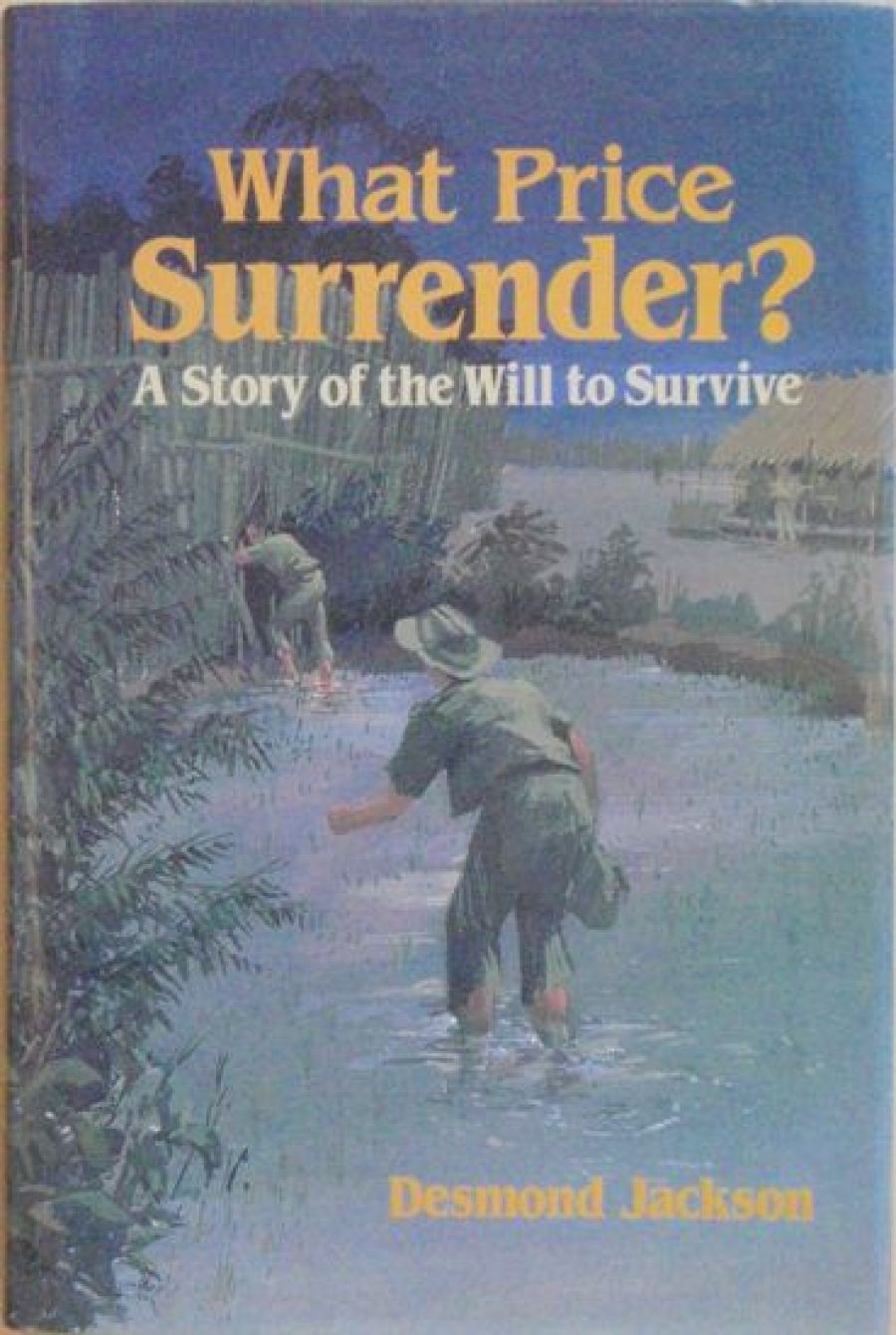
- Free Article: No
- Contents Category: Australian History
- Review Article: Yes
- Article Title: A pantheon of ordinary heroes
- Online Only: No
- Custom Highlight Text:
Mr Jackson’s book narrates his experience and that of a friend as prisoners of the Japanese in Thailand during World War II. It is neither a good nor memorable book, but it does raise, however unintentionally, significant issues. In a nation still bereft of a civil religion, that amalgam of myths and tales of heroes which defines a country’s sense of self and values, the experiences described by Mr Jackson should be honoured.
- Book 1 Title: What Price Surrender?
- Book 1 Subtitle: A story of the will to survive
- Book 1 Biblio: Allen & Unwin, 208 pp, $29.95 hb
Gallipoli is well served by prophets of Australian culture ranging from C.E.W. Bean and George Lambert to Peter Weir and David Williamson. As a feat of arms accomplished by combat-raw troops those final days of April 1915 are an incontestable triumph of the ordinary Australian. They triumphed in an Inkerman-like struggle which depended on the resolve, initiative and simple courage of the ordinary infantryman.
In these pacific times such virtues when applied to the task of killing people are not highly regarded. More importantly, for the vast number of Australians who are not of Anglo-Celtic ancestry, Gallipoli is a meaningless conflict. A beach stormed in a minor campaign in the service of Great Britain is hardly an appealing or even meaningful symbol of modern Australia.
The experience of Mr Jackson and the thousands of other Australians taken prisoner by the Japanese throughout southeast Asia in early 1942 is far more relevant. Slaughtering Turks to open the Bosphorus so that Tsarist Russia could take the pressure off British and French armies in Flanders may not make a great deal of sense to an Australian of Filipino or Chinese extraction. Fighting an expansionist power with apparent, if not real, aspirations against Australia’s territorial sovereignty is a much more powerful symbol. It is not doubt for reasons such as these that What Price Surrender? carries a jacket endorsement from Professor Geoffrey Blainey.
Certainly, the self-reliance and fatalistic courage of the men who rotted in Changi and died building the Burma Railway should be celebrated down the generations. For a pantheon of heroes as ordinary blokes, Australia can do no better than these men.
The problem with Mr Jackson’s book is that it adds little to our knowledge or reverence for the POW experience. This is not the work of a skilled writer and Mr Jackson’s editor (if indeed he enjoyed one’s ministrations) has failed him egregiously.
For some inexplicable reason Mr Jackson reports dialogue verbatim, providing a mock-transcript of conversations which occurred close to forty years ago and which in many cases he did not even witness. Nor is his an elegant prose style. A Thai gentleman speaks ‘stilted but fluent English’, an idea which is right is ‘a supposition which was immediately confirmed’. During a friend’s ‘baptism of fire ... his blood tingled with excitement’,
Mr Jackson and his friend Mr Ken Lindford (whose escape from the Japanese camp is the book’s focus) were captured by the Japanese in early 1942. They laboured on the Burma Railway and in a Thai railway town into 1945. Just short of the end of the war, Mr Lindford and two companions escaped with the assistance of a shadowy Thai resistance agent. Mr Jackson was not part of the escape party and the balance between his own and Mr Lindford’ s experience is blurred throughout the book. This is not to denigrate Mr Jackson’s experiences but a book about an escape which details less about the principal escapee than about one of his friends is inevitably off-balance.
Mr Lindford’s escape was not particularly spectacular - it was a matter of slipping quietly into the night to be met by Thai sympathisers This is not to minimise its achievement. The moral fortitude required to take the step from men beaten down by years of semi-starvation, illness and psychological abuse was vast. Yet this achievement is not communicated by Mr Jackson’s text.
This is the fundamental problem of What Price Surrender? It fails to live up to its subtitle. Mr Jackson describes the physical circumstances in which his colleagues lived and died and the techniques they used to minimise the horror of their lot. He fails to discuss their fears and how the misery of their experience changed characters. No matter how laconically accepted, it is incontestable that their sufferings were as much of the mind as the body.
Mr Jackson has chosen not to write about such matters - possibly the writers of memoirs and popular historians have told us all they can about these crucial symbols for Australian culture. A speculative understanding of what the generation which grew up during the Depression and fought in southeast Asia endured and what Australia should make of their experience may now be a task for the novelists.


Comments powered by CComment